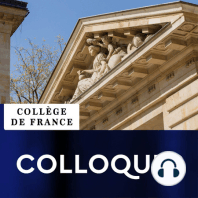Écoute de 44 min

Colloque - La nanofluidique à la croisée des chemins : Interfacial Water Dissociation through Proton Permeable Electrodes
Colloque - La nanofluidique à la croisée des chemins : Interfacial Water Dissociation through Proton Permeable Electrodes
évaluations:
Longueur:
23 minutes
Sortie:
25 mai 2023
Format:
Épisode de podcast
Description
Innovation technologique Liliane Bettencourt (2022-2023) - Lydéric BocquetCollège de FranceAnnée 2022-2023Colloque - La nanofluidique à la croisée des chemins : Interfacial Water Dissociation through Proton Permeable ElectrodesGraphene is completely impermeable in the perpendicular direction to its basal plane to all gases – even for helium, the smallest – at ambient conditions. In this context, it was expected that graphene would be impermeable even to protons, nuclei of hydrogen atoms. Nevertheless, we demonstrated that the transport of thermal protons through defect-free graphene is fast and can be measured experimentally. Graphene is also an excellent in-plane electron conductor. These properties allow using it as a proton permeable electrode. This talk will outline our work investigating its proton permeability and impermeability to all other ions, including recent work in which we demonstrate that defects are not necessary for its proton permeability. The talk will then cover the use of graphene as a proton permeable electrode to study proton transport, including the observation of a giant sensitivity to light. Using this well characterised system, we then explore the interfacial dissociation reaction (H2O = H+ + OH-) and discuss the observation of the Wien effect in this reaction in dark conditions and under illumination.Marcelo Lozada-HidalgoMarcelo Lozada-Hidalgo is a Royal Society University Research Fellow at The University of Manchester. His research interests include ion transport in 2D systems, interfacial dissociation reactions and photo-accelerated ion transport. He has been awarded an ERC Starting Grant (2021), a University Research Fellowship by the Royal Society (2020), a Dame Kathleen Ollerenshaw Research Fellowship by the University of Manchester (2019), an Early Career Fellowship by The Leverhulme Trust (2016) and the Andre Geim scholarship for PhD studies' after winning a national competition in Mexico in 2012.
Sortie:
25 mai 2023
Format:
Épisode de podcast
Titres dans cette série (100)
02 - Les sociétés africaines et le monde : une histoire connectée (1900-1980) - Le genre des connexions africaines au monde (1900-1980) de Colloques du Collège de France - Collège de France